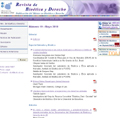O animal não-humano e seu status moral para a ciência e o Direito no cenário brasileiro
Article Sidebar

Main Article Content
Anamaria Gonçalves dos Santos Feijó
Cleopas Isaías do Santos
Natália de Campos Grey
The admission of non-human animals as sensible beings and possessors of interests is a historical and cultural process in constant development, no more restricted to the philosophical field, reaching also the legal scope and fomenting the discussion about the use (or not) of animals in experiences. Therefore, the objective of this work is to show how the debate about the non-human animal has been received in Brazil and how its legislation has following this theme. Through a theoretical and legal-normative analysis, the present study concludes that exist an increasing concern in protecting the animals against cruelty, towards their recognition as beings with dignity and also subjects of rights. However, it is necessary that society (which still is deeply anthropocentric) be capable of receive an ethic which respects the animals as ends in itselfs, as well as incorporates the existence of the moral relevance of non-human animals.
Article Details
Cómo citar
Gonçalves dos Santos Feijó, Anamaria et al. «O animal não-humano e seu status moral para a ciência e o Direito no cenário brasileiro». Revista de bioética y derecho, n.º 19, pp. 2-7, https://raco.cat/index.php/RevistaBioeticaDerecho/article/view/201223.
Derechos
Derechos de autor
Las/os autoras/es conservan los derechos de autoría de los artículos y autorizan a la Universitat de Barcelona a publicarlos en su Revista de Bioética y Derecho y a incluirlos en los servicios de indexación y abstracts, bases de datos académicas y repositorios en los que participa la revista.
Los trabajos publicados en la Revista de Bioética y Derecho están bajo la licencia Creative Commons Reconocimiento - NoComercial - SinObraDerivada 4.0 Internacional (by-nc-nd 4.0), que permite compartir la obra con terceros, siempre que éstos reconozcan su autoría, su publicación inicial en esta revista y las condiciones de la licencia. No se permite un uso comercial de la obra original ni la generación de obras derivadas.